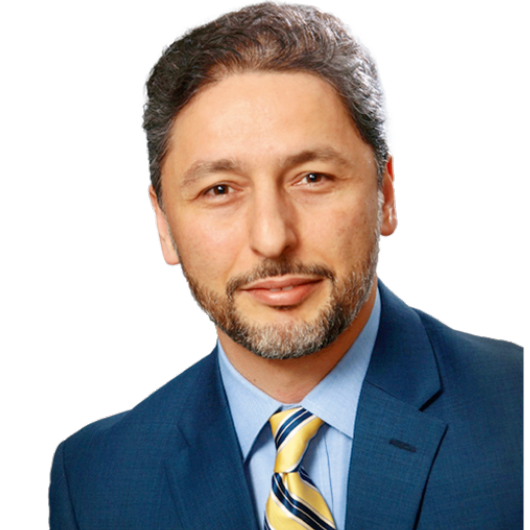
- 08.01.2025, Wednesday
- 20:54
Toward Singularity: The Future of AI and Humanity
23:487/01/2025, Tuesday
Next article
Kadir Üstün

We live in an era where artificial intelligence is rapidly permeating and transforming every aspect of life. With the exponential decrease in the cost of computing power, high-capacity chips have become much more accessible. Before the pandemic, the pace of digital economic transformation was relatively slow, but the pandemic marked a turning point in technological change. The normalization of hybrid work has redefined the concept of the workplace, while the digital economy has gained momentum in
We live in an era where artificial intelligence is rapidly permeating and transforming every aspect of life. With the exponential decrease in the cost of computing power, high-capacity chips have become much more accessible. Before the pandemic, the pace of digital economic transformation was relatively slow, but the pandemic marked a turning point in technological change. The normalization of hybrid work has redefined the concept of the workplace, while the digital economy has gained momentum in production untethered to physical locations. Economic activities, increasingly independent of both time and space, have enabled millions to simultaneously participate as both producers and consumers through digitalization.
The decreasing cost of processors and the incentives promised by the digital economy have been key drivers in advancing the algorithms that underpin artificial intelligence. Today, many believe we are on the brink of AI reaching "general intelligence"—a level where it surpasses human intellect across all domains. While some argue this development will fundamentally alter the concept of humanity, others dismiss such projections as exaggerated, claiming that technology won’t render humans obsolete or establish a post-human world run by robots.
Approaching the Singularity
Ray Kurzweil, known for his famous 1999 prediction that AI would reach human intelligence levels by 2029, argues in his book *The Singularity is Nearer* that we stand on the cusp of an era where the biological human mind will merge with the power and speed of digital technology. Kurzweil asserts that the famous Turing Test will be passed by this time, signifying that AI has become indistinguishable from human intelligence—a hallmark of general intelligence. To date, AI has already surpassed human intelligence in many specific domains. Reaching general intelligence would eliminate the distinction between carbon-based (human) and silicon-based (machine) intellect.
Contrary to apocalyptic scenarios suggesting that AI will evolve independently of humans and even lead to our destruction, Kurzweil envisions a future where the human mind surpasses its limitations by connecting to the cloud. He suggests that this integration will unlock creative potential beyond anything we can currently imagine. According to Kurzweil, when the singularity is achieved, the capacity of human intelligence will increase millions of times. He also argues that consciousness—a process driven by the complexity of information processing in our brains—could similarly arise in silicon-based systems.
The Human Body, Employment, and AI Strategies
Kurzweil predicts that technologies like 3D printing and nanotechnology will enable the precise production of desired materials and goods, making manufacturing accessible to everyone. He foresees a future where nanotechnology can eliminate diseases, maintain the human body, and extend lifespans, continually raising life expectancy. While the human body may gain longevity, Kurzweil believes intelligence will break free from the limitations of the body, marking the next stage in human evolution. By the 2040s and 2050s, it may become possible to repair, sustain, and rebuild the human body, ensuring that people will no longer be dependent on their biological forms to maintain consciousness and memory.
While AI promises to make human intelligence less dependent on the biological body, it also raises concerns about its impact on employment. Automation threatens to eliminate the need for repetitive human labor across many sectors. Futurists like Kurzweil see this as a natural progression, arguing that people will find opportunities in new fields and industries, as they have in the past. However, the rapid pace of technological change may create high-skill job opportunities while failing to replace lower-skill jobs at the same rate. Universal basic income has been proposed as a potential solution for displaced workers, though it carries its own challenges and risks of new social issues.
Kurzweil acknowledges that technologies like nuclear weapons, biotechnology, and nanotechnology could be misused, emphasizing the importance of regulation to ensure AI is used for good. He believes AI can help address critical issues like disease, hunger, and environmental degradation, but its misuse must be prevented. AI’s potential to radically extend human lifespans and transcend biological limits offers an optimistic vision, but it also demands thoughtful governance.
Preparing for the Future
These projections, which challenge the very notion of what it means to be human, signal radical changes in areas ranging from the digital economy and the nature of warfare to curing deadly diseases and transforming the labor market. The race among tech giants to control big data—dubbed the "oil of the 21st century"—is a cause for concern, as these firms have become more powerful than many nations. It’s clear that the future of a technology capable of deeply and permanently reshaping human minds and bodies cannot be left to the discretion of corporations alone. Both societies and governments appear unprepared for the singularity moment when AI surpasses human intelligence. Rather than waiting for predictions like Kurzweil’s to come true, it’s imperative to develop a comprehensive AI strategy now.
#Artificial Intelligence
#AI
#Singularity
LEGAL NOTICE
The BIST name and logo are protected under the "Protected Trademark Certificate" and cannot be used, quoted, or altered without permission.All rights to the information disclosed under the BIST name are entirely owned by BIST and cannot be republished. Market data is provided by iDealdata Financial Technologies Inc. BIST stock data is delayed by 15 minutes.
